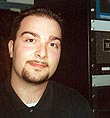|
|
 
|
|
Author
|
Topic: Do German and French films release in the DTS ?
|
Kamakshipalya Dhananjay
Expert Film Handler

Posts: 190
From: Bangalore, India
Registered: Aug 2002
|
 posted 08-30-2002 12:10 AM
posted 08-30-2002 12:10 AM




I always wondered whether European films feature the DTS sound as much as say American or Indian films. A German Film Festival is about to be arranged in my city and my participation is being sought. I have seen very German films and so, does anyone have any idea what digital sound formats are generally available in German films. Also, for French films. ------------------
| IP: Logged
|
|
|
|
|
|
Charles Everett
Phenomenal Film Handler

Posts: 1470
From: New Jersey
Registered: May 2001
|
 posted 08-31-2002 11:06 AM
posted 08-31-2002 11:06 AM




These titles from France were in DTS in the US:Va Savoir (Who Knows?)
Amelie
Brotherhood of the Wolf All three had their US release in the past 12 months. The Chambermaid on the Titanic (from 1998) used DTS in France but I'm not sure if it used DTS for the US release.
| IP: Logged
|
|
|
|
|
|
Jeffry L. Johnson
Jedi Master Film Handler

Posts: 809
From: Cleveland, Ohio, USA
Registered: Apr 2000
|
 posted 08-31-2002 06:14 PM
posted 08-31-2002 06:14 PM





LC Concept
Filmvorfuehrer Kinoton
Das L.C. Concept wurde 1991 in Frankreich von Pascal Chedeville entwickelt. Es funktionierte in etwa wie das heutige dts System. Anstatt von CD-ROM wurden zwei "Sony 5"1/4 rewritable magneto-optical discs" mit 300MB hergenommen. Mittels der Musicam Kompression (6:1) konnten bis zu 3h Filmton im 5.1 Format aufgezeichnet werden. Der L.C. Concept Prozessor konnte Einstellungen von mehreren Kinos speichern und konnte deshalb flexibel eingesetzt werden. Im Französischen Sprachraum wurden etwas 20 Theater mit dem System ausgestattet. Es wurden um die 30 Filme veröffentlicht (z.B.: Cyrano de Bergerac (1991), Until the end of the world (1991), Basic instinct (1992), Cliffhanger (1993), Free Willy (1994)). Es scheiterte daran, dass es keine Unterstützung von den großen Firmen bekam (unter anderen auch wegen der Dolby Digital Ankündigung). Pascal Chedeville bekam 1995 den Academy Award für technische Errungenschaften (technical achievement). Silver Screens - Le son numérique
Le son numérique (ou digital) est apparu en 1991 dans les salles de cinéma. Deux systèmes étaient
alors concurrents: le procédé français LC Concept, dont les initiales viennent de ses deux inventeurs
"Elisabeth Löchen et Pascal Chédeville" et le système américain CDS (Cinema Digital Sound),
développé conjointement par les sociétés Optical Radiation Corporation et Kodak. Le LC Concept fut dans un premier temps installé, sous forme de test grandeur nature pour le circuit
UGC, à l'UGC Triomphe sur les Champs-Elysées, par ailleurs également doté du son CHF Cabasse, et
ce à partir du 26 juin 1991. Le premier film à en bénéficier est alors Cyrano de Bergerac de Jean-Paul
Rappeneau, préalablement exploité en son analogique avant de finir sa carrière dans cette salle dans
des conditions de restitution sonores supérieures à celles de sa sortie! Le LC Concept consiste alors en la synchronisation d'un code temporel (ici un code barre) situé sur la
manchette du film, qui conserve ses deux pistes analogiques, et un disque magnéto-optique double
face présenté sous forme de cartouche. Si le procédé se décline en deux versions, le LC 4 à quatre
canaux de diffusion et le LC 6 à six canaux, il semble que la majorité des salles équipées, et celles qui
passaient le plus de films dans ce format, l'aient été en quatre pistes (trois enceintes derrière l'écran
-gauche, centre, droite- et une batterie d'enceintes réparties sur les murs gauche et droit de la salle
correspondant au canal d'ambiance ou surround). Le monde du cinéma est alors en émoi, des
réalisateurs se prennent à rêver: certains vont
plonger très vite dans l'aventure du son numérique:
Wim Wenders avec Jusqu'au bout du monde
(exploité au Max Linder Panorama en Super 35),
Alain Corneau avec Tous les Matins du monde
(César du meilleur son), Jean-Jacques Annaud
avec L'Amant, Claude Lelouch avec La Belle
Histoire (le film fut apparemment reproduit en LC
Concept au Palais des Congrès de Paris où il fut
exploité durant quelques semaines en
avant-première et en 70 mm), Roman Polanski
avec Lunes de Fiel, Jean-Jacques Beineix avec IP5
(qui fit ainsi l'ouverture le 12 juin 1992 du Gaumont
Grand Ecran Italie), Paul Verhoeven avec Basic
Instinct, Emir Kusturica avec Arizona Dream... Malheureusement, une mauvaise politique commerciale (le procédé était, selon ses inventeurs,
prioritairement destiné aux "grandes salles de prestige"), conjuguée à un quasi-vol du brevet par le
système américain DTS en 1993, le tout suivi par une longue action en justice qui interdira par exemple
l'exploitation en France de Jurassic Park en DTS (projeté chez nous en simple Dolby SR), va
condamner le procédé qui sera finalement vendu aux Américains. Il semble que le Max Linder fut la salle française à passer le plus de films en LC Concept. Elle conserve
d'ailleurs le matériel ainsi que quelques disques, et repasse régulièrement, lors du festival annuel "Le
Max Linder fait sa Cinémathèque", Arizona Dream dans ce format aujourd'hui disparu. Il est à noter
également que la salle Prestige de l'UGC Normandie a projeté Basic Instinct dans ce système, la
projection étant précédée d'un déroulant-image comportant simplement le nom du procédé. Exemples
de salles qui furent équipées en LC Concept : Max Linder Panorama, Gaumont Grand Ecran Italie, UGC
Triomphe, UGC Normandie, Forum Horizon... IMDb list Chronologie : le son
1989
France
Le "LC Concept" : Procédé de son numérique (disque laser asservi à la projection) mis au point par Elisabeth Lôchen et Pascal Chédeville. Ce premier procédé sonore numérique sera utilisé pour le film "Cyrano de Bergerac" (1990) et "Jusqu'au bout du monde" de Wim Wenders, puis sera abandonné un an plus tard. Le procédé à "insipiré" Universal pour mettre au point le système DTS. http://awards.fennec.org/years/Y-1995x.html
1995
The 68th Annual Academy Awards
Scientific And Technical Awards
Technical Achievement Award - Certificate
Sound
Pascal Chedeville
For the design of the L.C. Concept Digital Sound System for motion picture exhibition Formats de son numérique Nick's Auditorium : the Digital Revolution
L.C.Concept was the first digital sound-on-disk system available. The soundtrack was placed on 2 5"1/4 rewritable magneto-optical disks manufactured by Sony. The 2 disks were capable of storing 300MB of data each, equivalent to 90 minutes of soundtrack so the system could handle films of maximum 3 hours. The sound-mix with 4 or 5.1 discrete channels was compressed with the MUSICAM-algorithm (Masking Pattern Universal Subband Integrated Coding and Multiplexing). It was a variation on ISO/MPEG Layer 2 lossy coding algorithm and provided a 6:1 compression ratio. The standard SMPTE time-code track, located on the analog soundtrack side if the film, provided synchronization. In order to avoid the need to restart the setting process each time the system was transferred to a other theater, several settings could be stored in the processor. L.C.Concept, developed by Frenchman Pascal Chedeville, was first demonstrated in 1991 with a experimental re-release of the 1990 film "Cyrano de Bergerac". Late 1991 "Jusqu'au bout du monde" was the first commercial release to feature the system. In 1994 the system was modified for use with CD-ROMs instead of magneto-optical disks but it was never put to use commercially. The system had no technical drawbacks (unlike CDS) but the L.C.Concept company failed in 1994 mainly because of a lack of financial strength caused by large companies not supporting the system in anticipation of Dolby's announced digital system in 1991. Pascal Chedeville received in 1995 an Technical Achievement Academy award. In total some 20 theaters in France, Switzerland and Belgium were equipped with the system and about 30 films featured a L.C.Concept soundtrack.
| IP: Logged
|
|
|
|
All times are Central (GMT -6:00)
|
|
Powered by Infopop Corporation
UBB.classicTM
6.3.1.2
The Film-Tech Forums are designed for various members related to the cinema industry to express their opinions, viewpoints and testimonials on various products, services and events based upon speculation, personal knowledge and factual information through use, therefore all views represented here allow no liability upon the publishers of this web site and the owners of said views assume no liability for any ill will resulting from these postings. The posts made here are for educational as well as entertainment purposes and as such anyone viewing this portion of the website must accept these views as statements of the author of that opinion
and agrees to release the authors from any and all liability.
|

 Home
Home
 Products
Products
 Store
Store
 Forum
Forum
 Warehouse
Warehouse
 Contact Us
Contact Us




 Printer-friendly view of this topic
Printer-friendly view of this topic















